This is probably my favorite anime of the Winter 2014 season. (I say “probably” because there are some other good shows that are about to end and one of them still might surprise me.)
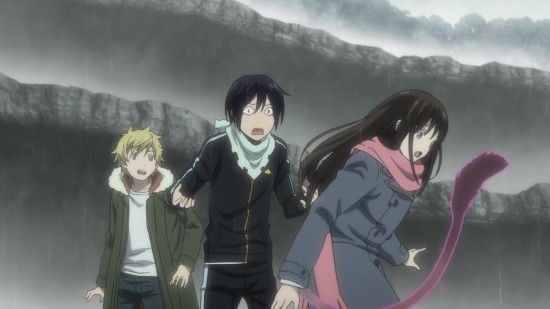
This is, of course, a shounen action-adventure series with all that implies, but it is an outstanding example of the genre: well-written and well-thought-out, with fascinating characters.
It’s a bit dark, with elements of horror; certainly not a show for small children. But it’s solidly entertaining and basically upbeat.
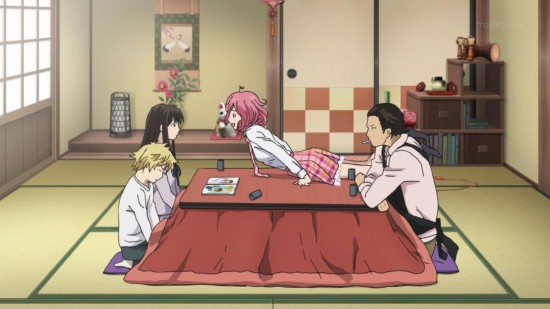
The first season tells a satisfactory story, but it is obviously not a complete story. This is based on an ongoing manga and the producers clearly hope to get financing for additional seasons. Some unresolved issues include:
- We don’t know Yukine’s backstory (though it must be tragic.)
- We’re missing key part’s of Yato’s backstory. Why did he become a God of Calamity and why did he decide to reform?
- Bishamon is Yato’s deadly enemy, though we have only a rough idea why. Since she is an honorable enemy the conventions of the genre pretty much require them to eventually become allies.
- Nora seems to be the main villain, but we know virtually nothing about her. As a major villain she should find some sort of redemption, maybe at the very end of the story. (This convention, often infuriating to Western viewers, may reflect the Mahayana Buddhist belief that even the worst criminal will eventually become a Buddha.)
- And of course there’s the main question: will Yato ever have a shrine of his own? No one wants or expects to see him achieve all his grandiose dreams, but surely he could at least have a modest shrine in some obscure location?
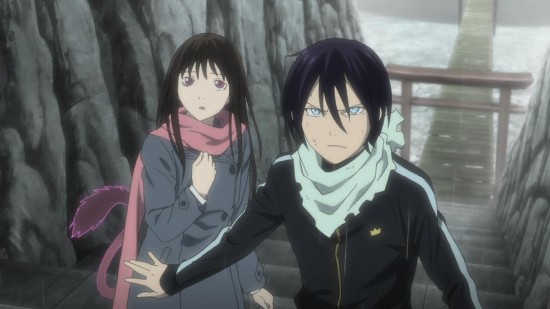
Unlike some shows that draw on Shinto traditions, this one takes Shinto ideas seriously if not always reverently. (How reverent can it be if the hero is a homeless loser god?)

The author does not hesitate to add elements to Shinto tradition to meet the requirements of the story. For example, while “shinki” is not a made-up word, I’m pretty sure that the way shinki work in this story is not canon.
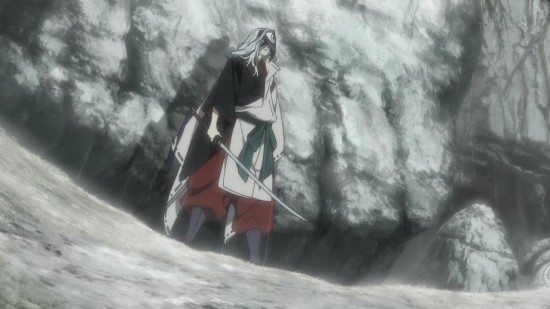
This show provides the best account I have ever heard of the oblivious bystander effect that is so common in fantasy anime, but which is usually left unexplained.
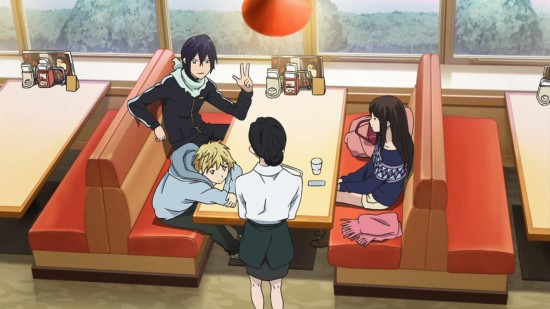
WAITRESS: Welcome! Have you decided on your order?
YATO: Us too Miss! Bring us water!
WAITRESS: Huh? Oh! I’m so sorry!
HIYORI: I thought people couldn’t see you because you’re not human.
YATO: That’s not it. We’re not invisible, just hard to notice. People can see us. To illustrate, how many waitresses are in here? Hey, no peeking!
HIYORI: Uh…two? (Looks around.) Huh, there’s four!
YATO: That’s how it is. Yukine and I blend into the background, just like the two waitresses you didn’t see. We can be noticed by people, be we are forgotten soon after.
WAITRESS: Here you are, I’m sorry!
YATO: You don’t remember everyone you ever passed on the street right? Since we’re from the Far Shore, it’s like that but more so.
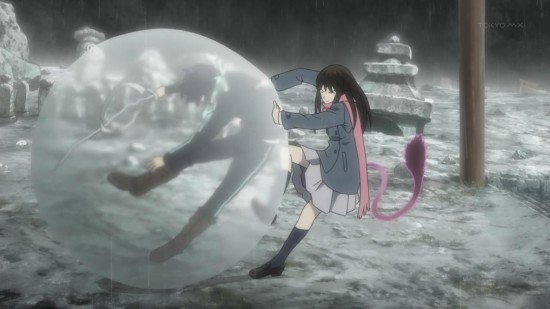
This show is licensed and streamed by Funimation. Crunchyroll, Funimation’s main rival in anime streaming in North America, has recently been setting very high standards for the quality of its translations. Unfortunately I can’t say the same for Funimation. It’s not that the subtitles are wrong, exactly, but some of the choices are infelicitous.
Consider that decision to translate “ayakashi” as “phantom.” It’s not exactly wrong. If this were a lighthearted children’s show it might be fine. But the word “Phantom” in English sounds rather silly. It evokes images of a man wearing a cape and domino mask, or maybe a bad movie by George Lukas.
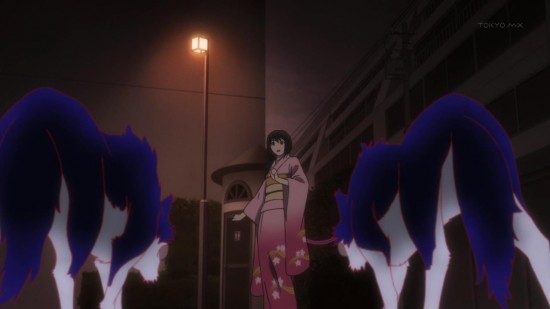
But the ayakashi in Noragami are supposed to be really scary. English fantasy writers, when they want to create something really frightening, generally give it an unfamiliar or made-up name, like “Dementor” or “Nazgûl.” A better choice here would be to leave “ayakashi” untranslated. It has a nice creepy sound. Or at least pick just about any synonym other than “phantom.”

Even worse is the decision to translate “shinki” as “Regalia,” when they could have just translated the characters literally as “divine instrument” or “divine vessel.” I can guess where the translators got the idea. They did a quick search for the characters and found “Sanshu no Jingi“, known in English as the “Imperial Regalia of Japan.”
But in this context it just doesn’t work. The Imperial Regalia are inanimate objects (though presumably sacred.) The shinki of Noragami are people, through whom a god exerts his power. Hence the literal “divine instrument” is much better.
Other anime series use the same word with the alternate pronunciation “jinki,” generally to refer to sacred inanimate objects, and never translated as “regalia.” The word “regalia” really only makes sense when preceded by the word “imperial.” It means objects held by a monarch as a symbol of his status.

